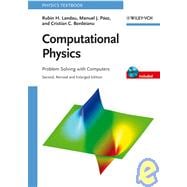
Manuel J. Páez;, PhD, is a professor in the Department of Physics at the University of Antioquia in Medellín, Colombia. He teaches courses in computational physics, programming, and nuclear physics. He and Professor Landau have conducted pioneering computational investigations in the interactions of mesons and nucleons with nuclei.
Cristian C. Bordeianu received his physics degree from Bucharest University, Romania, and his M.Sc. degree in Computer Science from "A.I.Cuza" University in Jassy, Romania. He is currently completing work towards a Ph.D. degree in Nuclear Physics at Bucharest University. He has over ten years of experience in developing Computational Physics educational software for high schools and University curricula. His current research interests include chaotic dynamics in nuclear multifragmentation and plasma of quarks and gluons.
| Introduction | |
| Computational Physics and Computational Science | |
| How to Use this Book | |
| Computing Software Basics | |
| Making Computers Obey | |
| Computer Languages | |
| Programming Warmup | |
| Shells, Editors, and Programs | |
| Limited Range and Precision of Numbers | |
| Number Representation | |
| IEEE Floating Point Numbers | |
| Over/Underflows Exercise | |
| Machine Precision | |
| Determine Your Machine Precision | |
| Structured Program Design | |
| Summing Series | |
| Numeric Summation | |
| Good and Bad Pseudocode | |
| Assessment | |
| Errors and Uncertainties in Computations | |
| Living with Errors | |
| Types of Errors | |
| Model for Disaster: Subtractive Cancellation | |
| Subtractive Cancellation Exercises | |
| Model for Roundoff Error Accumulation | |
| Errors in Spherical Bessel Functions (Problem) | |
| Numeric Recursion Relations (Method) | |
| Implementation and Assessment: Recursion Relations | |
| Experimental Error Determination | |
| Errors in Algorithms | |
| Minimizing the Error | |
| Error Assessment | |
| Object-Oriented Programming: Kinematics | |
| Problem: Superposition of Motions | |
| Theory: Object-Oriented Programming | |
| Theory: Newton's Laws, Equation of Motion | |
| OOP Method: Class Structure | |
| Implementation: Uniform 1D Motion, unim1d.cpp | |
| Assessment: Exploration, shms.cpp | |
| Integration | |
| Problem: Integrating a Spectrum | |
| Quadrature as Box Counting (Math) | |
| Algorithm: Trapezoid Rule | |
| Algorithm: Simpson's Rule | |
| Integration Error | |
| Algorithm: Gaussian Quadrature | |
| Empirical Error Estimate (Assessment) | |
| Experimentation | |
| Higher Order Rules | |
| Differentiation | |
| Problem 1: Numerical Limits | |
| Method: Numeric | |
| Forward Difference | |
| Central Difference | |
| Extrapolated Difference | |
| Error Analysis | |
| Error Analysis (Implementation and Assessment) | |
| Second Derivatives | |
| Trial and Error Searching | |
| Quantum States in SquareWell | |
| Trial-and-Error Root Finding via Bisection Algorithm | |
| 1 Bisection Algorithm Implementation | |
| Newton-Raphson Algorithm | |
| Matrix Computing and N-D Newton Raphson | |
| Two Masses on a String | |
| Classes of Matrix Problems | |
| Data Fitting | |
| Fitting Experimental Spectrum | |
| Fitting Exponential Decay | |
| Theory: Probability and Statistics | |
| Least-Squares Fitting | |
| Appendix: Calling LAPACK from C | |
| Deterministic Randomness | |
| Random Sequences | |
| Monte Carlo Applications | |
| A RandomWalk | |
| Radioactive Decay | |
| Implementation and Visualization | |
| Integration by Stone Throwing | |
| Integration by Rejection | |
| High-Dimensional Integration | |
| Integrating Rapidly Varying Functions | |
| Thermodynamic Simulations: Ising Model | |
| Statistical Mechanics | |
| An Ising Chain (Model) | |
| The Metropolis Algorithm | |
| Computer Hardware Basics: Memory and CPU | |
| High-Performance Computers | |
| The Central Processing Unit | |
| High-Performance Computing: Profiling and Tuning | |
| Rules for Optimization | |
| Programming for Data Cache | |
| Differential Equation Applications | |
| UNIT I. Free Nonlinear Oscillations | |
| Nonlinear Oscillator | |
| Math: Types of Differential Equations | |
| Dynamical Form for ODEs | |
| ODE Algorithms | |
| Solution for Nonlinear Oscillations | |
| Table of Contents provided by Publisher. All Rights Reserved. |
The New copy of this book will include any supplemental materials advertised. Please check the title of the book to determine if it should include any access cards, study guides, lab manuals, CDs, etc.
The Used, Rental and eBook copies of this book are not guaranteed to include any supplemental materials. Typically, only the book itself is included. This is true even if the title states it includes any access cards, study guides, lab manuals, CDs, etc.